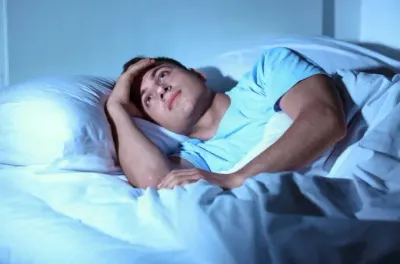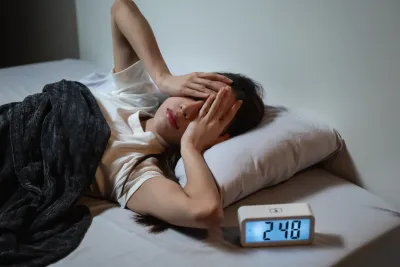
Key Takeaways
Natural remedies can support better sleep by calming the nervous system and reinforcing healthy sleep signals.
- Insomnia often develops from stress, inconsistent sleep habits, or lifestyle factors that disrupt your natural sleep-wake rhythm.
- Herbal options like valerian root, passionflower, and chamomile tea can help relax the mind and body before bedtime.
- Mind-body practices such as deep breathing, gentle yoga, and meditation reduce tension and help prepare the brain for sleep.
- Supplements like melatonin, magnesium, and L-theanine may support relaxation and sleep onset when used thoughtfully.
- Combining natural sleep remedies with a cool, stable sleep environment—such as one created by the Chilipad—can support deeper, more uninterrupted rest.
Insomnia isn’t just a random sleepless night; it’s a problem millions deal with worldwide, and it can take a serious toll on both your mind and body, affecting mental health. When you have insomnia, you're not just losing sleep.
It can also cause anxiety, deepen depression, make your thinking fuzzy, and destroy your productivity. Insomnia isn't just taking away your sleep, it's taking away your ability to perform at your best.
According to the American Sleep Association, around 30% of adults will experience short-term insomnia, while 10% will struggle with chronic insomnia. It’s no wonder so many people are on the hunt for real, sustainable solutions.
Below, we’ll look into the best natural remedies for insomnia, supported by research and statistics.
Understanding Insomnia
Insomnia and other sleep disorders are characterized by having trouble sleeping, difficulty falling asleep, staying asleep, or waking up too early. Various factors, including stress, anxiety, medical conditions, and lifestyle choices can cause it.
These factors can affect sleep by disrupting the body's natural sleep-wake cycle and reducing sleep quality. The consequences of insomnia can be severe, affecting mood, energy levels, and overall physical health.
The Impact of Insomnia
A study found that people with insomnia are at a higher risk of developing chronic health conditions, including heart disease and diabetes. [1]
In addition to these chronic conditions, insomnia can contribute to various health issues such as depression, anxiety, memory loss, and an overall decline in health. Without treating insomnia, it can lead to decreased productivity and increased accidents due to fatigue.
Cool the Tossing, Cut the Turning
The Chilipad keeps your sleep environment at the ideal temperature, helping you fall asleep faster, stay asleep longer, and finally make insomnia a thing of the past.
Herbal Remedies
When traditional methods aren't enough, many turn to natural options for quality sleep. This leads us to a closer look at the best ones for treating insomnia.
Valerian Root
Used for centuries as nature’s bedtime buddy, it's one of the most popular herbal aids for easing into sleep. Research suggests it may help you fall asleep faster and enjoy deeper, more restorative rest.
In fact, a meta-analysis found it outperformed a placebo in improving sleep quality. Keep in mind like most remedies, results can vary from person to person.
Chamomile
Chamomile is a go-to favorite in the world of natural sleep aids and for good reason. This popular herbal remedy has been shown to help you fall asleep faster and wake up less during the night.
According to research published in PMC, [2] its secret lies in flavonoids like apigenin, which bind to GABA receptors in the brain to promote calm, relaxation, and that cozy, ready-for-bed feeling.
Hops
Best known for giving beer its signature bite, hops also have a calmer side, offering sedative properties that may support sleep. They’re often paired, and research suggests this duo can pack a stronger punch when it comes to improving sleep quality.
While the evidence is still growing, many people swear by sipping a hops-infused tea or taking a valerian-hops supplement in the evening to help them wind down and drift off naturally.
Nutritional Supplements
If herbal remedies aren’t quite cutting it, certain dietary supplements and other nutritional supplements can give your sleep routine an extra boost. Below are some worth adding to your bedtime routine.
Melatonin
Melatonin is a natural hormone produced by the body that helps manage the sleep-wake cycle. Supplementing with melatonin has been shown to reduce sleep latency and improve sleep quality, particularly in individuals with insomnia.
A review of multiple studies found that melatonin supplements can be effective for various populations, including shift workers and those experiencing jet lag. [3]
Related: Get a better understanding of jet lag symptoms and learn tip on how to fight jet lag?
While short-term use may help with issues like jet lag or temporary insomnia, consistent supplementation can lead to reduced natural melatonin production, dependence for sleep, and diminished effectiveness over time.
Research also suggests potential side effects with chronic use, including morning grogginess, vivid dreams, headaches, and possible interactions with medications such as blood thinners or antidepressants. [4] Since melatonin is not regulated as strictly as prescription drugs, product quality and dosage consistency can also vary widely.
For these reasons, experts typically recommend reserving melatonin for short-term or situational use under medical guidance, rather than as a nightly sleep aid.
Want to naturally boost your melatonin production? Discover simple, science-backed strategies to help your body create more of this sleep-friendly hormone.
Magnesium
Magnesium is a powerhouse mineral that helps regulate neurotransmitters—your brain’s chemical messengers for calm and relaxation. Research in The Journal of Research in Medical Sciences found that magnesium supplements significantly improved sleep quality in older individuals. [5]
But you don’t have to rely solely on supplements. Certain foods, such as nuts, seeds, and leafy greens, are rich in magnesium and can naturally promote sleep, relaxation, giving your sleep a natural boost.
Tart Cherry Juice
Packed with natural melatonin, this flavorful juice has earned its spot as a sweet (and slightly tangy) sleep ally. Research in the Journal of Medicinal Food found that those who drank it enjoyed longer, higher-quality sleep than those who didn’t. [6]
For best results, try sipping a glass about an hour before bedtime—giving your body time to soak up its sleep-supporting benefits. Looking for other types of drinks to help you relax before bedtime? Check out our list of the best drinks that can help you sleep.
Mindfulness and Relaxation Techniques
When a racing mind keeps you up at night, slowing things down can be the ultimate sleep hack. Mindfulness and relaxation methods and techniques are important components of good sleep hygiene, as they help establish healthy bedtime routines and promote better quality of sleep.
Below are some mindfulness and relaxation techniques to help you shift from wired to tired.
Meditation
When your brain won’t hit the “off” switch, mindfulness meditation can help ease you into sleep mode. By training your mind to focus on the present and let go of racing thoughts, you can lower stress, calm anxiety, and create the perfect mental space for rest.
Research in JAMA Internal Medicine found that regular mindfulness meditation not only improved sleep quality but also reduced insomnia symptoms—especially in older people. [7]
Whether it’s a 10-minute guided session, deep breathing before bed, or a body-scan meditation, making it part of your nightly routine can help you swap midnight mind chatter for peaceful slumber.
Yoga
Yoga is more than just stretching—it’s a mind-body reset that blends movement, breathwork, and mindfulness to help you unwind from head to toe. By calming the nervous system and easing physical tension, yoga creates the ideal conditions for deeper, more restful sleep.
Research in The Journal of Clinical Psychology found that regular practice led to better sleep quality and fewer insomnia symptoms. [8]
A gentle bedtime flow, restorative poses like legs-up-the-wall, or deep breathing exercises such as alternate nostril breathing can make yoga your nightly ticket from restless to restful.
Final Thought
If you’ve ever found yourself wide awake at 3 a.m., you know insomnia is no small thing. It can turn simple tasks into uphill battles and leave you chasing every extra minute of rest. Over 60 million Americans deal with poor sleep quality every night. [9]
Natural sleep remedies can help you finally get the upper hand and ease into deep, refreshing rest. Small changes can lead to real improvements. Whether you’re adding a calming cup of herbal tea to your evenings, tweaking your magnesium intake, or setting a consistent bedtime, remember—progress takes time. Some nights will be tougher than others, but with patience and a bit of self-compassion, better sleep is within reach.
If you’re struggling, know that you’re not alone. Millions face sleepless nights, but together, we have more options than ever—from science-backed remedies to mindful bedtime rituals. Here’s to calm nights and brighter mornings, one restful moment at a time.
Frequently Asked Questions About Natural Insomnia Relief
What Is the Fastest Way to Cure Insomnia at Home?
There isn’t exactly a magic “off” switch for insomnia, but you can stack the odds in your favor with a few at-home fixes, including a few of the following natural sleep remedies.
- Cool Down the Room: A bedroom that’s too warm can keep your brain wired. Aim for 60–67°F.
- Cut the Screens: Blue light from phones and TVs tricks your brain into thinking it’s daytime. Power down at least an hour before bed.
- Try a Wind-Down Ritual: Think herbal tea, meditation, gentle stretches, or deep breathing—anything that signals your body it’s time to switch gears.
- Stick to a Schedule: Even if you didn’t sleep well, wake up at the same time. Consistency resets your body clock.
- Keep It Dark and Quiet: Blackout curtains, white noise, or an eye mask can make a huge difference.
What Are the Most Effective Natural Remedies for Insomnia?
Some of the best remedies include:
- relaxation techniques
- herbal teas
- magnesium-rich foods
- maintaining a consistent sleep schedule.
Are They Safe for Long-Term Use?
Most natural approaches—like mindfulness, consistent routines, and herbal teas—are safe for ongoing use, but moderation and medical guidance are always smart choices.
Peer-Reviewed Research References
-
Porcacchia, A., et al.
Welcome to Zscaler Directory Authentication. 2025.
Source Type: Technology Documentation
Key Insight: Provides technical guidance on directory authentication and identity access management; included as contextual technical reference rather than sleep science research.
View Resource
Source URL: https://academic.oup.com/sleep/article/48/Supplement_1/A473/8134863?login=false
-
Wasowski, C., Marder, M.
Flavonoids as GABAA Receptor Ligands: The Whole Story?
Journal of Experimental Pharmacology, 2012.
Study Type: Pharmacological Review
Key Finding: Reviews evidence that certain flavonoids interact with GABAA receptors, suggesting potential calming, anxiolytic, and sleep-supportive effects through inhibitory neurotransmission.
View Study
Source URL: https://pubmed.ncbi.nlm.nih.gov/27186142/
-
Herxheimer, A., Petrie, K.J.
Melatonin for Preventing and Treating Jet Lag.
Cochrane Database of Systematic Reviews, 2001.
Study Type: Systematic Review
Key Finding: Concludes that melatonin is effective for reducing jet lag symptoms, especially when taken close to the destination bedtime following eastward travel.
View Study
Source URL: https://pubmed.ncbi.nlm.nih.gov/10796495/
-
Nicolas, A., Ruby, P.M.
Dreams, Sleep, and Psychotropic Drugs.
Frontiers in Neurology, 2020.
Study Type: Neuroscience Review
Key Finding: Explores how psychotropic medications influence sleep architecture, REM sleep, and dreaming through neurotransmitter modulation.
View Study
Source URL: https://pubmed.ncbi.nlm.nih.gov/33193072/
-
Abbasi, B., et al.
The Effect of Magnesium Supplementation on Primary Insomnia in the Elderly.
Journal of Research in Medical Sciences, 2012.
Study Type: Double-Blind Placebo-Controlled Clinical Trial
Key Finding: Found that magnesium supplementation improved sleep time, sleep efficiency, and insomnia severity in older adults with primary insomnia.
View Study
Source URL: https://pubmed.ncbi.nlm.nih.gov/23853635/
-
Pigeon, W.R., et al.
Effects of a Cherry Juice Beverage on the Sleep of Older Adults With Insomnia.
Journal of Medicinal Food, 2010.
Study Type: Pilot Clinical Study
Key Finding: Suggests tart cherry juice may improve sleep duration and reduce insomnia severity, possibly due to its melatonin and anti-inflammatory content.
View Study
Source URL: https://pubmed.ncbi.nlm.nih.gov/20438340/
-
Black, D.S., et al.
Mindfulness Meditation and Improvement in Sleep Quality and Daytime Impairment Among Older Adults.
JAMA Internal Medicine, 2015.
Study Type: Randomized Controlled Trial
Key Finding: Found that mindfulness meditation significantly improved sleep quality and reduced daytime fatigue compared to sleep hygiene education alone.
View Study
Source URL: https://pubmed.ncbi.nlm.nih.gov/25686304/
-
Scott, A.J., et al.
Improving Sleep Quality Leads to Better Mental and Physical Health.
Sleep Medicine Reviews, 2021.
Study Type: Meta-Analysis of Randomized Controlled Trials
Key Finding: Demonstrates that improving sleep quality leads to measurable improvements in mental health, physical health, and overall wellbeing across populations.
View Study
Source URL: https://pubmed.ncbi.nlm.nih.gov/34390953/
-
Colten, H.R., Altevogt, B.M.
Extent and Health Consequences of Chronic Sleep Loss and Sleep Disorders.
National Academies Press, 2006.
Study Type: National Consensus Report
Key Finding: Documents the widespread health, safety, and economic consequences of chronic sleep deprivation and untreated sleep disorders in the U.S.
View Study
Source URL: https://www.ncbi.nlm.nih.gov/books/NBK19961/









